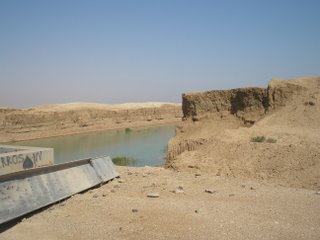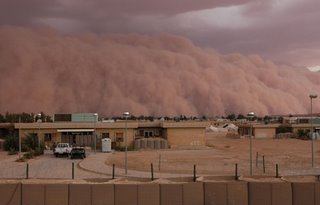Book reviews for May '06
Finished a few books this month, the two most notable being Robert Young Pelton's '
The Adventurist' and A.J. Venter's '
War Dog: Fighting Other People's Wars, The Modern Mercenary in Combat'. Interesting stuff for an amateur Polisci like myself trying to make sense of the world. And not dull or overly dry academic either. Also fun is '
Mr. China: A Memoir' by Tim Clissold.
Robert Young Pelton, 'The Adventurist'
RYP is an interesting guy. Lived a tough childhood in Canada before settling in California to make his money. Real tough; after his parents divorce him and his brother went to this Christian boarding school in Alberta, Canada, that sounded a lot like training I went through in the military (known as the 'Toughest Boys School in North America'). He reflects on it a little when he reads that people were killed there recently, doing crazy things like canoe trips in blizzards.
Later on he settles down and is successful at what he does, but somewhere along the line he develops this itch to travel. And not normal travel either- he starts going to war zones in Africa, Asia and other areas. Soon enough he takes it up professionally. Makes for some interesting reporting as he develops his rough style of 'survival reporting' in places like pre-9/11 Afghanistan and Africa, among others. For someone like me, and others similarly impressed by these stories, it is pure 'travel porn'.
As 'The Adventurist', he proceeds with his storytelling and minimalist style to places of ill repute and dispute. He starts to develop this almost Nietzchean 'will to power' ethos of survival and flourishing amidst the suffering and danger he encounters. Entertaining, yes; but ultimately to me it's empty and hollow. A few episodes stand out for me- an encounter with the SEALS in Coronado, California and later on a plane; his interview of Filipino revolutionary/hitman (one of his victims being the CIA chief at the time); and another interview with guerrillas in Bougainville, Papua New Guinea where he lionizes their leader. But as you can imagine, he loses me in his condescension and incomprehension of the military. His encounter with the SEALs he soliloquizes on their differences:
"I feel at home with these men. Clear-eyed, focused men who wait for their moments. Nevertheless there is a difference. They wait for someone else to unleash them. I've never had a leash."
Can I get a psycho-therapist for that one, what what... nah, don't bother. I wanted to like this book and his work, based on his impressive exploits. But ultimately his nihilism was too much for me. Entertaining stuff for the magazines, but don't think I'll buy more of his books.
A.J. Venter, 'War Dog: Fighting Other People's Wars, The Modern Mercenary in Combat'
A.J. Venter's tome on mercenaries was a bit longer to get through, but good material for an overview on mercenary involvement in African wars over the past decades. The book focuses mostly on Sierra Leone, Angola and a few pages on past developments in the Congo, as well as looking forward to events in Sudan and Iraq. A lot of it was about the controversial 'Executive Outcomes' group, composed mainly of South Africans, but also British, American and a few other Westerners.
Not encyclopedic, but quite thorough- much of it based on personal experience, as well as quite a bit on illuminating interviews. 90% of what he said was true to my reckoning- with many of the people being fought were cannibalistic, rapist savages left to do what they want by an impotent international community hiding behind the ineffective UN. Revolving revolutions in many of these countries, different only in their destruction. A bleak picture for Africa in that way. In the end, those 'crude' but professional soldiers working for money can do way more with much less. Not theoretically- but proven over and over. And as a result, PMC's (private military companies) are on the up and up, as seen in current places like Baghdad and the Sudan. However, why are people so skeptical of these mercenaries? What has lead to this situation?
Not acknowledging the drawbacks directly weakens the overall point. Although my 'academic instincts' (for lack of a better word- those who know me will be hard-pressed to acknowledge any academic authority on this) kind of cringed at the one-sided presentation of things. For a guy who was intimately involved in some of these events, it makes it difficult to acknowledge the other side. Not the cannibalistic insurgents, hard to defend them or their backers in places like Taylor's Liberia or Ghadaffi's Libya, but the drawbacks of having to hire foreigners to enforce a nations sovereignty.
It's kind of funny, while I disagreed with
P.W. Singer's 'Corporate Warriors', in a weird way it's more respectable. I'm deliberating over whether the reason for that is style or substance- but one must notice Singer's book is annotated and organized as a project for the Brookings Institution. He puts the issue in a more theoretical perspective which I disagree with, focusing on the centrality of the nation-state, something a cursory reading of Africa will quickly disabuse the reader of. Unless you mean nation-state only to apply to Western-style democracies or their authoritarian variant a la the Cold War and present-day Russia... but I digress.
The truth of the matter seems to me- as long as nation-states, or multinational organizations such as NATO or the UN or EU, etc., fail to provide some manner of security, someone will exploit that. You can expect that in a situation where many who are poorly educated will continue to push some old Soviet/Marxist people's war. Of course with some type of local characteristics (a la Africa, Nepal, and more- in places like that, discredited communist ideology can be an improvement from current conditions), unless given a reason not to. And for most in situations like these, policymakers and local statesmen are limited to few options- the primary one being military force of some type, depending on resources. The rational discourse of representative democracy and free-market economics won't 'spontaneously occur' without reasonable stability. Why work and educate oneself for years with a poor chance of success, when you can kill or rape and take it today. That's part of the curse of the 'Third World'.
Tim Clissold, 'Mr. China: A Memoir'
What's not to like about this book? It's a story about a guy who gets involved in China's business and foreign financing debacles in the 1990's. He, of course, wants to be 'The Old China Hand' (Zhongguo tong- putonghua de tong), the expert on the area. But there are problems during this crazy time China is 'discovering capitalism'.
The book is enjoyable, even if it doesn't go too in depth. Although it's lightness and vagueness is part of the story, I think. He travels there as a student, gets hooked. Comes back as a businessman after being bored in London and wants to see it again. Gets hooked up with a venture capitalist eventually who tours the country with him to pump some money into China- straddling Wall Street and the Great Wall he gets his hands dirty in post-Mao/post-Tiananmen China.
As you can imagine, people steal money, try to cheat the owners, pull bureaucratic strings and other debacles. The troubles encountered almost kill him with stress. But during this duress he realizes he has to provide a Chinese solution, rather than traditional business as we know it. He ends up staying out there, bringing his family along. Not mentioned much in the book, but 4 kids! That alone would be interesting.
An interesting look at the times- also a bit of insight into the crazy westerners who get caught up in the whole deal. A few things same and others different. A weird lot, for sure. I'll probably go out there again sometime, so it's nice to read books like this.
A few good reads, got more on the way.



